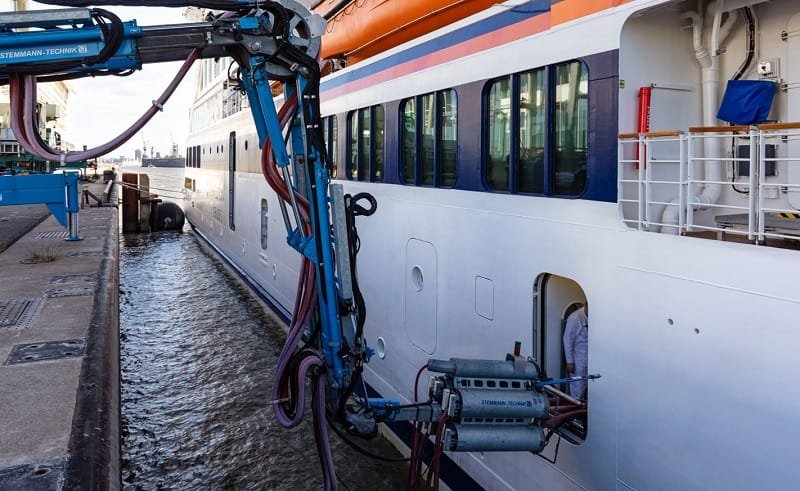Hapag-Lloyd Cruises, a leading luxury and expedition cruise brand, has demonstrated its continued commitment to sustainability with the latest developments from the expedition ship HANSEATIC spirit. The vessel, part of the luxury cruise line’s expedition fleet, recently arrived in Hamburg after successfully completing its first-ever 100% biofuel bunkering in Amsterdam, this environmentally friendly GoodFuels‘ Biofuel, derived from waste materials, is expected to reduce the ship’s CO₂ emissions by at least 80%, marking an important step forward in the cruise line’s efforts to lower its carbon footprint.
Alongside the biofuel trial, HANSEATIC spirit also tested its shore power connection while docked at the Hamburg Cruise Center Altona. This successful test reinforces Hapag-Lloyd Cruises’ commitment to integrating cleaner energy sources into its operations, as shore power allows ships to turn off their engines while in port, further reducing emissions.
This twin achievement – biofuel bunkering and shore power testing – underscores Hapag-Lloyd Cruises’ leadership in the luxury and expedition cruise sector’s drive toward decarbonisation.
Table of Contents
Pioneering Maritime Decarbonisation
As the maritime industry faces increasing pressure to reduce greenhouse gas emissions, Hapag-Lloyd Cruises is positioning itself at the forefront of the movement toward cleaner energy. Maritime decarbonisation is a complex challenge, requiring a multi-faceted approach that includes the adoption of alternative fuels, cleaner technologies, and operational efficiency improvements. With regulations tightening, including the International Maritime Organization’s (IMO) goal to reduce carbon intensity by 40% by 2030, the use of biofuels and shore power is becoming crucial for cruise operators looking to comply with global sustainability goals.
Hapag-Lloyd Cruises’ decision to trial biofuels, alongside its use of marine gas oil (MGO) with just 0.1% sulphur content since 2020, highlights the company’s proactive stance on sustainability. The introduction of second-generation biofuels – derived from residues and waste materials – represents a leap forward, especially since these fuels can significantly cut CO₂ emissions and contain minimal sulphur oxides.
Hapag-Lloyd’s Role in Decarbonisation and Biofuels
Hapag-Lloyd Cruises has been steadily working towards reducing the environmental impact of its operations. In 2022, HANSEATIC inspiration, a sister ship to HANSEATIC spirit, successfully tested a blend of 30% biofuel with MGO, reducing CO₂ emissions by up to 90%. This test marked a crucial step in proving the viability of biofuels for the cruise industry.
Now, with HANSEATIC spirit running entirely on certified biofuel from waste materials, Hapag-Lloyd Cruises is setting a new standard in sustainable cruising. By relying on biofuels that are non-competitive with food production, the company not only reduces its reliance on fossil fuels but also minimizes its overall environmental impact. The cruise line’s use of biofuels aligns with broader industry efforts to explore alternative fuels, such as LNG, ammonia, and hydrogen, as part of the global push for maritime decarbonisation.

Expanding the Fleet’s Environmental Capabilities
Hapag-Lloyd Cruises’ fleet, consisting of five vessels, includes three modern expedition ships: HANSEATIC nature, HANSEATIC inspiration, and HANSEATIC spirit. These vessels have been designed with advanced environmental technology, such as selective catalytic reduction (SCR) systems that reduce nitrogen oxide emissions. Additionally, all ships in the expedition class are equipped to use shore power, further demonstrating the company’s commitment to sustainable cruising.
The expedition ships are purpose-built for navigating both polar and tropical regions, offering passengers a blend of adventure and luxury while minimizing environmental impact. The ships’ low draught and highest ice-class ratings allow them to reach remote destinations such as the Arctic and Antarctic, while also exploring warmer regions like the Amazon.
Biofuels as a Key to Future Sustainability
Biofuels represent a crucial part of the future of marine fuel, particularly as the cruise industry seeks solutions to meet increasingly stringent environmental regulations. These fuels, derived from renewable sources such as waste oils and biomass, offer a more sustainable alternative to traditional marine fuels. Their ability to significantly cut CO₂ emissions, along with their near-zero sulphur content, positions them as a viable option for operators looking to reduce their environmental impact without sacrificing operational efficiency.
For Hapag-Lloyd Cruises, the successful bunkering of biofuel for HANSEATIC spirit marks a milestone in its sustainability journey. The company’s ongoing efforts to integrate alternative fuels and technologies demonstrate its leadership in creating a more sustainable future for the maritime industry.
About Hapag-Lloyd Cruises
Hapag-Lloyd Cruises is a leading luxury and expedition cruise brand. The current fleet includes five ships, each offering an exceptional travel experience. The EUROPA and EUROPA 2 have been recognized as the world’s best luxury cruise ships by the Berlitz Cruise Guide, receiving the top rating of 5-stars-plus.
The expedition segment, which includes the HANSEATIC nature, HANSEATIC inspiration, and HANSEATIC spirit, is on a growth trajectory. These ships, equipped with advanced environmental technology and shore power capabilities, represent the future of sustainable cruising. The fleet is capable of navigating both polar and tropical regions, delivering exceptional service, culinary variety, and innovative routing across the globe.
Source Hapag-Lloyd Cruises

